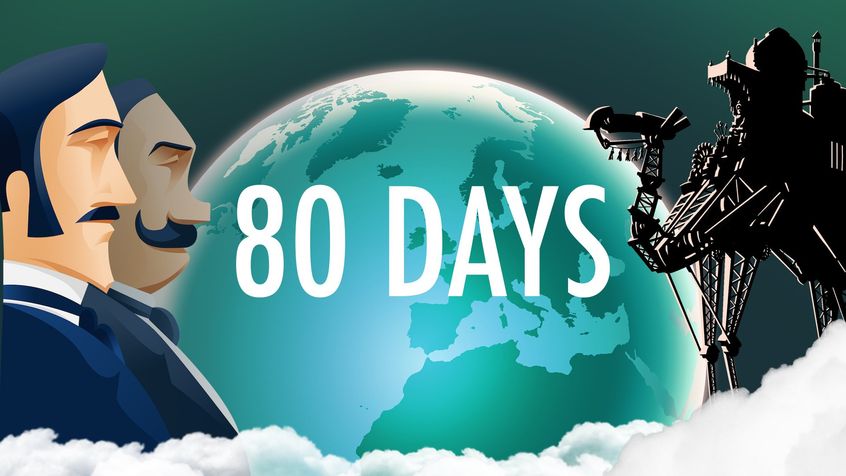80 Days
I admit, when I started this project, I got really excited that 80 Days was second on my list. I had played this game a fair few times before starting this project, and I am always excited to play it again.
I mentioned in my 35MM review that I love story games. More than anything, I love a game that will immerse me in a story, or let me at least tell a good story. I like building and exploring, and I like seeing what happens along the way. 80 Days, while not a builder, is a story game, and one where you very much get back what you put in.
The plot of 80 Days closely mirrors “Around the World in 80 Days” by Jules Verne. Passepartout and his erstwhile employer, Phileas Fogg, must travel around the world in 80 days or fewer so Phileas Fogg can win his bet. In the game, as in the novel, the pair have various misadventures and misfortunes, but it’s in how the game chooses to interpret this rough idea that it really shines. 80 Days not only tells the story of Passepartout traveling around the world, but sets it in a world that is similar to, but not the same as our own. Is Passepartout a veteran of the Napoleonic Wars and havoc wreaked by airships on his beloved Paris? Is he an exploitative imperialist, or a friend to everyone he meets? Does he love the shiny allure of steampunk technology, or is he afraid of what the future holds? Everything is your decision, and yet, also shaped by what you happen to run into along the way.
It’s not just the story and the possibilities within it that keep me coming back, though. The world of 80 Days is one I keep wanting to explore and learn more about. I’ve played through the game many times, and each time, I issue myself a new challenge. I decide to explore the great Zulu empire, for example, or take the Trans-Siberian Railway, or talk my way on to a vodou powered metal bird on its way to Haiti. 80 Days is, as I said, a world that resembles our own, but is separate, and it’s in that difference that we see so many possibilities, not just within the game, but in the world outside.
80 Days represents the opportunity to look at our history and our identity and choose to reframe and retell that story through empowerment and possibility. Rather than deciding the history of the world always includes the looting of Africa, 80 Days instead examines why that narrative is so present, and retells the story with Africa on top. In each city, there is nuance and a careful examination of who people are and who they could be. I love it for that, for the world it chooses to build.
From a gameplay perspective, I could talk about the little things here and there that bug me on occasion. I wish the game had a better pause button, and I wish the luggage system was a little clearer when deciding routes, but honestly, these are nitpicky, and don’t reflect the real experience. The real experience of 80 Days is of going on an adventure around the world with a man who could be anyone to you, cities that could be just a stop, or a place where you choose to end the journey, and keeping your eyes always on the horizon. It’s sweet and fun, and endlessly replayable.
Developer: Inkle
Genre: Indie, Story
Year: 2014
Country: United Kingdom
Language: English
Play Time: 1.5 - 2 Hours
